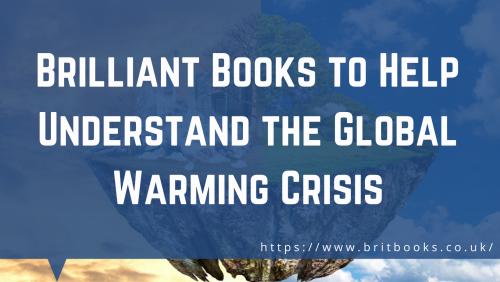Brilliant Books To Help Understand The Global Warming Crisis

So you'd like to learn more about climate change but don't know where to start? As defined by many scientists, the Anthropocene Epoch is an era of geological time marked by human impact on Earth's geology and ecosystems. So, this has become important to read global warming reference books.
The environment is rapidly approaching a tipping point from which people may never be able to recover as the Earth's temperature rises and natural disasters become more regular. But grasping the plethora of facts about the status of our world is only the first step.
Then you'll want to look into the sociopolitical implications of those facts, such as the disproportionate impact of climate change on Native peoples and people of color and the corporate profit motives and disinformation campaigns that are preventing us from enacting climate-friendly policies.
To get you started, we've compiled a list of 5 of the most important climate change texts—some ancient, some new, all desperately clear-eyed about the issues confronting our planet. It's not an exhaustive survey, but it's a good starting point for anyone wishing to widen their horizons. You'll be ready to phone your representatives, attend Sunrise Movement protests, and become a force for change in your town once you've finished these best books on global warming.
Under a White Sky: The Nature of the Future, by Elizabeth Kolbert
The Pulitzer Prize-winning author of The Sixth Extinction returns with another somber look at our Anthropocene Epoch, focusing on scientists' pioneering efforts to roll back the doomsday clock rather than the numerous tragedies ahead. Under a White Sky's topics are "people trying to solve problems produced by people trying to solve problems," and she focuses her lens on human interventions in nature, such as the historic redirection of the Chicago River, as well as the pressing need for more intervention to the right our foolishness.
She documents her contacts with experts pioneering cutting-edge technologies to transform carbon emissions into stone and send diamonds into the stratosphere. She travels from the Great Lakes to the Great Barrier Reef. Kolbert's compelling, extensively researched text, lauded by everyone from Barack Obama to Al Gore, questions if our inventiveness can outrun our hubris.
Losing Earth: A Recent History, by Nathaniel Rich
Losing Earth follows the emergence of political awareness about global warming over the vital decade of 1979 to 1989 and policymakers' numerous failures to confront the increasing climate threat. Instead, as Rich demonstrates in careful historical detail, officials sided with profit-hungry businesses, which waged a vast disinformation and denial campaign that continues to impact today's political life.
Even though his book is about the lost decade in the fight against climate change, Rich ends positively, claiming that there is still time to save our planet. To see if you share his optimism, read Losing Earth, a fascinating narrative of human greed and folly.
Windfall: The Booming Business of Global Warming, by McKenzie Funk
You've heard of climate change's science, but what about its economics? Funk traversed the world for six years, reporting this methodically built book, interacting with scores of businesspeople profiting handsomely from climate change, from Israeli merchants making fortunes on artificial snow to Dutch architects constructing floating cities.
As it turns out, the climate issue is a huge business, with ungodly quantities of money moving hands between a select few while the rest of the world suffers. Funk exposes the greedy economic methods of environmental tycoons seeking to keep society on life support, revealing that the adage "follow the money" holds.
Storming the Wall: Climate Change, Migration, and Homeland Security, by Todd Miller
Miller crosses the globe in this foresightful book to document enormous swaths of people evacuated from their homes by climate calamity, resulting in a new wave of climate refugees. In addition, Miller draws a strong link between climate change and border militarization based on extensive research and testimonies from military officials to shed light on Homeland Security's efforts to criminalize climate asylum seekers.
According to the World Bank, over one billion people are expected to become climate refugees by 2050; unless our policymakers change course, those refugees will be pitted against the brutal, racist, and lucrative surveillance nations depicted so vividly in Storming the Wall.
The Uninhabitable Earth: Life After Warming, by David Wallace-Wells
In The Uninhabitable Earth, Wallace-Wells states, "This is not a book on the science of warming; it is a book about what warming means to the way we live on this planet." The Uninhabitable Earth is visceral and scary, transforming scientific projections into beautifully depicted realities, with Wallace-Wells creating bleak depictions of existence at each degree of warming.
Climate change, food insecurity, geopolitical war, global epidemics, and cascading natural calamities are among the dire predictions he makes. Wallace-Wells foresees an awful, cruel, and wholly self-inflicted doom. Consider The Uninhabitable Earth an unavoidable wake-up call since "it is worse, much worse, than you believe," as Wallace-Wells argues.
Article Source: https://www.britbooks.co.uk/blog/brilliant-books-to-help-understand-the-global-warming-crisis.html

Comments